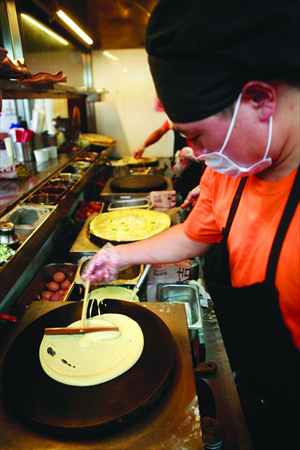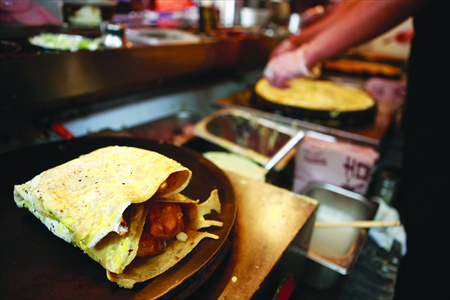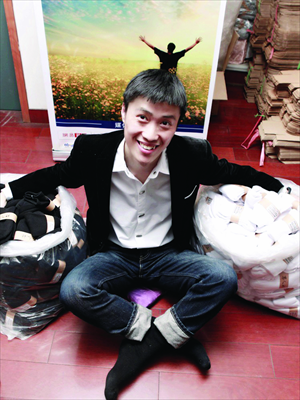HOME >> METRO BEIJING
Small idea, big business
By Zhang Zihan Source:Global Times Published: 2013-9-5 18:23:01

The pure joy of a humble jianbing. Photo: Li Hao/GT
Jianbing, Chinese crepes with egg, soy sauce and a rice cracker or fried flour stick wrapped inside, are a favorite Beijing breakfast. The price of an ordinary jianbing is usually about five yuan (85 cents) on the street, making the humble snack seem unlikely to generate much profit. However, for Huangtaiji, a small restaurant in Jianwai SOHO, jianbing have become the goose that laid the golden eggs.
Huangtaiji opened in July 2012, and in the last year drew sales of more than 5 million yuan ($817,000). According to a recent estimate by Chinese venture capital firm Ventures Lab, Huangtaiji is worth more than 40 million yuan. Its owner is planning to expand his business overseas.
Ambitious entrepreneurs are trying to create success stories like this in China every day. How can a small, common idea boom into a big business? To find out, Metropolitan talked to the entrepreneurs behind three successful startups. All three are based on ordinary facets of everyday life: breakfast, socks and the menstrual cycle.

Jianbing are quick to make and easy to standardize.Photo: Li Hao/GT

A Huangtaiji jianbing. Photo: Li Hao/GT
Keep them talking
The space inside Huangtaiji is very cramped and narrow, only 20 square meters with 16 seats, but it's always full of customers from morning to midnight. Many of them are return customers who are loyal to the food served: handmade jianbing, fresh pressed soy-bean milk, and traditional bean curd jelly.
He Chang, the 32-year-old owner of Huangtaiji, explained to Metropolitan why he chose making jianbing for his business. "If a Chinese restaurant wants to develop quickly, it has to find something equivalent to hamburgers and pizza. Jianbing is easy to cook in a standardized way," says He.
All the jianbing in Huangtaiji are freshly made. From ordering to serving only takes three to five minutes. According to posters inside the restaurant, they are all handmade with fresh flour, fresh eggs and healthy oil, to ensure an authentic taste. But apart from the quality of the food, many customers are attracted by Huangtaiji's sales techniques.
He previously worked for Google China and Baidu in the marketing and user experience departments. He uses the techniques of online sales in selling jianbing. He keeps creating talking points so the restaurant will be discussed in social media. For example, when the first restaurant opened, He worked as a delivery boy and delivered fresh jianbing in his Mercedes-Benz. He mentioned this story in many speeches, saying the first delivery he made in this way surprised the customer. "He took a photo of us and posted it on the Internet, and the name Huangtaiji quickly rocketed through Chinese social networks," He recalled.
Though He no longer uses his Mercedes-Benz to deliver jianbing, Huangtaiji still uses other fancy vehicles, such as Segways and smart cars. And these vehicles do attract lots of customers. Qian Mingliang, an insurance client manager, told Metropolitan this is one of the reasons he chooses Huangtaiji rather than other delivery services. "This is Beijing, people are always looking for something extraordinary. If you want to stand out, you have to be different. In this instance, I think Huangtaiji succeed," Qian says.
He also considers communication with the customer to be very important. His personal mobile phone number is posted inside the shop, and he personally replies to any questions from customers. He also runs the Huangtaiji Sina Weibo account.
He explained to Metropolitan why he insists on directly communicating with his customers. "This is an Internet Age. All entrepreneurs should be open-minded. If the owner of a business doesn't do everything to close the distance between himself and his customers, then he is unqualified. I will keep responding to customers' inquiries personally in future, no matter how big our business will grow. This is my hobby, and the central spirit of Huangtaiji, " says He.

Chen Bole and his sock empire. Photo: Courtesy of Chen Bole
Socks are us
The second entrepreneur to speak with Metropolitan was Chen Bole, who sniffed out a rare opportunity in the men's fashion industry. Most fashion insiders say that compared with woman, it is more difficult to sell clothing to men, not only because men update their wardrobes much less frequently than women, but also because they usually don't spend much time on shopping.
Thinking about this, Chen, 30, an ex-programmer and current e-commerce businessman, caught wind of an opportunity, and founded Nanrenwa, a Chinese website that sells socks for men. Since it was established in 2010, his site has sold socks to more than 50,000 customers. Although this number might not seem large, Chen believes the future is promising.
"Men are more loyal customers than women. Once they consider a product to be good, they will continue purchasing it. Especially for socks. Unlike other clothing, which a man may wear for a long time, socks wear out quickly. For this reason, men constantly need socks. So selling men's socks actually has a steady return," says Chen.
Chen says that of his total of 50,000 customers, more than 40 percent are repeat buyers, demonstrating his theory that men are more loyal consumers. "Customers generated a sales volume of 1.2 million yuan in 2012, and right now the business is growing quickly. Hopefully our sales will reach 4 million by the end of 2013," says Chen.
The central business of Nanrenwa is providing a sock delivery service, similar to a magazine subscription. The customer can tick the delivery period by week, month or quarter online, and the company will send the socks to their home. The website has very simple user interface. Socks are only available in two materials, two sizes and three colors. This may seem crazy to women, who would typically have 10 different kinds of stockings to choose from at a store, but Chen says that simpler is better for men.
"Anyone who wants to do business with men should remember they always want to save trouble. So fewer selections and a simplified user interface helps them to make a decision quickly, and also makes the buying process more efficient. From this aspect, men are ideal customers," says Chen.
"What we are doing now is providing the best socks and services to save customers trouble. This will gradually build up a brand, and attract loyal customers," says Chen.
Periodic table
The third entrepreneur to speak to Metropolitan designed China's top app to help women track their periods. It was designed by a man, 27-year-old Chai Ke.
The app is called Dayima, which has the same sound as (but different Chinese characters from) the Chinese nickname from menstruation. It has been downloaded 65 million times since it was launched in January 2012, and has attracted nearly 100 million yuan in venture capital. It has 20 million registered users on Android, iOS and Windows Phone systems, and 1.9 million daily active users.
Chai returned to China to start up his own business in 2009 after he finished his college education in Canada. Dayima is his ninth app. He says all of the eight previous apps were failures.
"I tried to combine health care service with the mobile Internet in my previous attempts, but they failed to work for two reasons. First, mobile Internet users demand an instant response, but health problems are usually long term issues and the changes are not easy to observe," he explained. However, periods usually come every month, and are easy to observe.
"Second, programmers and application developers don't know about the feeling of those who have health issues, hence we failed in those programs," says Chai. To solve this problem, Chai and his team wore sanitary napkins every month, even though they are all men.
"Though we cannot feel the cramps, by doing this we can feel part of the inconvenience, which would help us to understand woman's troubles during their period," says Chai.
But this is certainly not enough to make Dayima a top period tracking application. Chai and his team devoted a lot of energy to the content. The application predicts when your period will come based on past patterns, predicts when you are most fertile and when to have sex without fear of pregnancy, offers health tips on avoiding cramps and pre-menstral syndrome, and links to an online discuss forum.
Chai says that it is important to understand that women are changeable customers. "Woman are disloyal when they can choose different products, and they love chasing new things. This is both negative and positive to us, as it means they can give us up quickly, and we have to keep updating Dayima all the time. We constantly update the appearance and user interface of Dayima, so as to keep it fresh to the users," says Chai.
Posted in: Metro Beijing